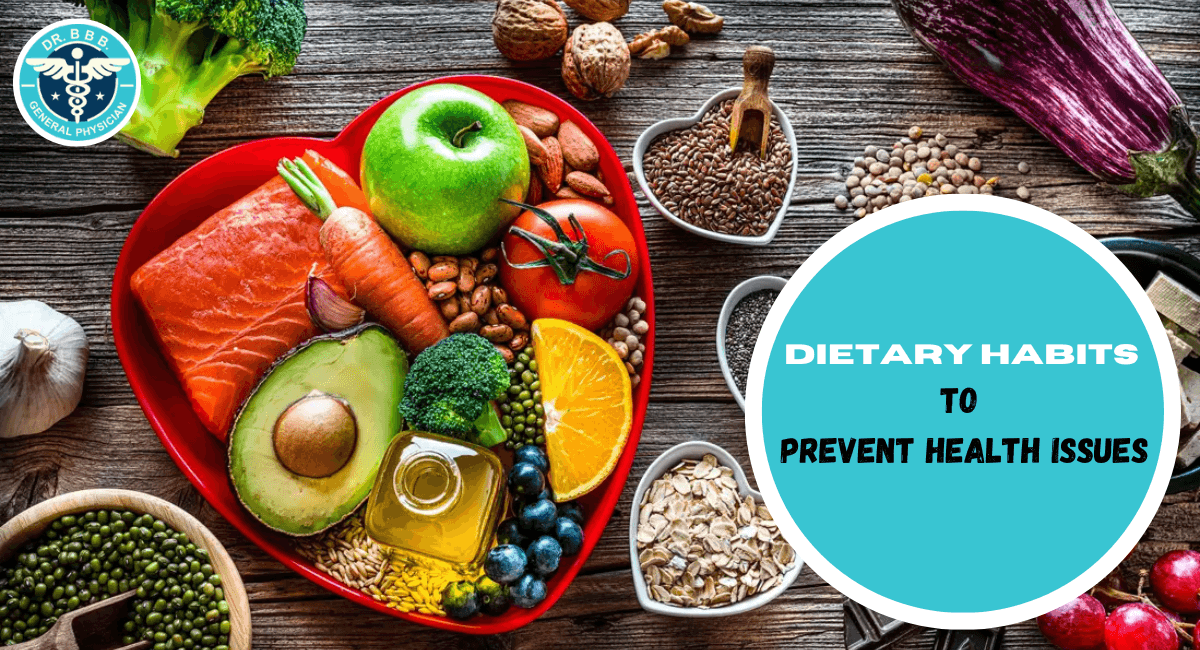Dietary Habits to Prevent Health Issues: What You Should Eat and Avoid
As general physicians, we often hear the saying, “You are what you eat.” But how many of us truly pay attention to the long-term impact of our food choices?
Our dietary habits significantly influence our health, and adopting the right practices can prevent several health issues. Let’s take a closer look at how you can make the right food choices to improve your overall well-being.
Why Dietary Habits Matter?
Dietary habits go beyond mere calorie counting. They affect every organ system in your body, from your digestive system to your cardiovascular health. By choosing the right foods and avoiding harmful ones, you can reduce your risk of chronic diseases such as heart problems, diabetes, and even certain cancers. We want to help you make informed decisions so you can enjoy a healthier life.
What You Should Eat for Optimal Health
To maintain good health, it is crucial to focus on nutrient-dense foods that offer a variety of benefits. Here’s a breakdown of the essential food groups you should include in your diet:
1. Fruits and Vegetables
Packed with vitamins, minerals, and antioxidants, fruits and vegetables are the foundation of a healthy diet. They help protect your body from oxidative stress and inflammation, which are common culprits behind chronic diseases.
- Eat a variety of colours like greens, reds, yellows, and purples.
- Leafy greens like spinach and kale are rich in iron and calcium.
- Berries and citrus fruits provide a good dose of Vitamin C.
2. Whole Grains
Whole grains like brown rice, oats, and quinoa are excellent sources of fibre. Fibre helps in digestion and keeps your blood sugar levels in check, reducing the risk of type 2 diabetes.
- Opt for whole wheat bread over white bread.
- Include barley, millets, and ragi in your diet for better heart health.
- Rolled oats or steel-cut oats are healthier alternatives to processed cereals.
3. Lean Proteins
Proteins are the building blocks of our cells. They help in muscle repair and are essential for maintaining good metabolic health.
- Include chicken, turkey, and fish like salmon, which are rich in Omega-3 fatty acids.
- For vegetarians, lentils, chickpeas, and tofu are great protein sources.
- Eggs, low-fat dairy, and nuts can also contribute to your daily protein intake.
4. Healthy Fats
Not all fats are bad. In fact, healthy fats are essential for brain function, hormone production, and joint health.
- Use olive oil or coconut oil for cooking.
- Add avocados, almonds, and flaxseeds to your meals.
- Fish like mackerel and sardines are rich in Omega-3, which is beneficial for heart health.
Foods You Should Avoid
Equally important is avoiding or limiting foods that can cause long-term harm. Here’s a list of what you should steer clear of:
1. Processed Foods
Highly processed foods like packaged snacks, fast food, and ready-to-eat meals are laden with unhealthy fats, sugars, and salt. These contribute to weight gain, hypertension, and high cholesterol levels.
- Avoid frozen pizzas, instant noodles, and chips.
- Processed meats like sausages and hot dogs should be limited.
- Check food labels for hidden sugars and preservatives.
2. Sugary Beverages
Drinks like soda, sweetened tea, and packaged fruit juices are packed with sugar. These can lead to insulin resistance, which can pave the way for type 2 diabetes.
- Replace sugary sodas with water, herbal teas, or coconut water.
- Limit your intake of packaged fruit juices, even if they claim to be “natural.”
- If you need sweetness in your beverages, opt for natural sweeteners like honey.
3. Refined Carbohydrates
Refined carbohydrates, such as white bread and pastries, cause a rapid spike in blood sugar levels. This can lead to weight gain and increase your risk of metabolic syndrome.
- Switch to whole grains like brown rice or multigrain bread.
- Avoid sugary breakfast cereals and white pasta.
- Minimise consumption of sweets, cakes, and biscuits.
4. Excessive Salt
Too much salt can raise your blood pressure and increase the risk of stroke and heart disease.
- Limit the use of table salt and opt for herbs and spices to flavour your food.
- Avoid canned soups, pickles, and processed cheese that are high in sodium.
- Read food labels to check for added salts in packaged foods.
How to Build Sustainable Dietary Habits?
Building healthy eating habits isn’t about making drastic changes overnight. It’s about small, sustainable steps that add up to significant improvements over time.
1. Meal Planning
Planning your meals in advance can help you make better food choices. It also reduces the likelihood of impulsive, unhealthy eating.
- Prepare a weekly menu that includes a balance of proteins, vegetables, and whole grains.
- Cook meals at home to control the ingredients and portion sizes.
- Include a healthy snack option like fruits or nuts to avoid reaching for junk food.
2. Mindful Eating
It’s not just what you eat, but how you eat that makes a difference. Practice mindful eating to improve digestion and prevent overeating.
- Eat slowly and chew your food thoroughly.
- Avoid eating in front of the TV or while using gadgets.
- Pay attention to your body’s hunger and satiety signals.
3. Hydration
Often, we overlook the importance of hydration. Water plays a critical role in maintaining your body’s functions and flushing out toxins.
- Aim to drink at least 8-10 glasses of water a day.
- Include hydrating foods like cucumbers and watermelon in your meals.
- Avoid excessive caffeine and alcohol, which can dehydrate your body.
When to Seek Medical Advice?
If you’re struggling to make dietary changes or experiencing symptoms like fatigue, sudden weight gain or loss, digestive issues, or frequent headaches, it’s time to consult a professional. These could be warning signs of underlying health issues that require medical attention. In case of medical concerns, it’s best to contact your Kolkata general physician for personalized advice.
Remember, adopting healthy dietary habits today can help you prevent future health complications. Let’s make informed food choices together and take proactive steps toward a healthier lifestyle.
Final Thoughts on Dietary Habits to Prevent Health Issues
Your diet is your strongest ally in preventing health issues. By eating nutrient-dense foods and avoiding harmful ones, you take charge of your health. In the end, it’s about balance — eating a variety of foods that nourish your body and give you the energy to live your best life. Let’s continue making smarter, healthier food choices for a better tomorrow.




